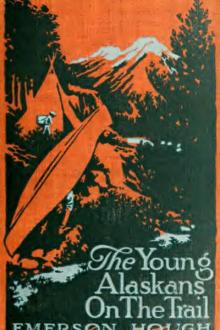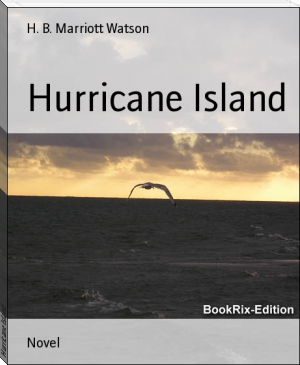The Young Alaskans by Emerson Hough (love books to read txt) 📕

- Author: Emerson Hough
- Performer: -
Book online «The Young Alaskans by Emerson Hough (love books to read txt) 📕». Author Emerson Hough
“If only we could get hold of some of those fellows,” said John, longingly, one morning, as they saw an especially fine flock pass slowly up toward the head of the lagoon. “I’ll warrant they’d be good to eat. See, some of them can hardly fly yet, they’re so young.”
“Yes,” said Jesse, “if we had only thought of it last week, they probably would not have been able to fly at all—flappers, they call those young birds. Then we might possibly have killed some of them in the grass at the head of the lagoon.”
“We could kill all we wanted now with the rifles,” commented Rob; “but, as I said awhile ago, I don’t think we ought to use rifle ammunition for killing birds. No one can tell how much we may need our cartridges later on. No, I don’t think we will get any geese unless we can catch them with our hands. I haven’t much faith in those throwing-cords that Skookie was showing us.”
John turned to his friend Skookie. “S’pose you catch-um geese, Skookie?” he asked.
The Aleut boy surprised them very much by his sudden use of English.
“Sure!” he said. He had perhaps learned this word from associating with whites somewhere down the coast.
His prompt reply made them all laugh, but none the less it was of yet greater interest than this.
“How do you mean, Skookie?” asked Rob. “How can you catch a goose when you have no gun? You can’t get close enough.”
It was always a problem how much English the Aleut understood or did not understand. Now he made his answer by diving into the back of the barabbara and coming out with the curious bunch of thongs which the boys had noticed him carrying when they first encountered him on the beach—a dozen thongs attached to a common centre, each being a couple of yards in length, and each bearing at its extremity a perforated ivory ball perhaps of an ounce or so in weight.
“Well, that don’t look very much like a goose-hunt to me,” said John; “but it seems to me I’ve read about the Eskimos using something of this sort. Maybe it’ll work on geese, though it looks like a mighty funny kind of shot-gun to me.”
“It’s an old weapon of wild people,” said Rob. “I’ve read about that sort of thing. They use it in South America for catching animals, and there they call it the bolas, or balls. I think they use stones down there, and of course they are a great deal heavier than these little ivory weights.”
He motioned to Skookie to show how he proposed to use this curious device. The Aleut, understanding perfectly what was required, again caught the thongs by their central ring and deftly began to whirl them about his head. Aiming at a post which stood up in the grass near the barabbara, he finally cast loose his whirling thongs, which promptly wrapped tightly around the post as they flew. The young brown hunter grinned at this, and all the boys were surprised at the force with which the thongs clung about the object of the aim.
“Jinks!” said John. “I shouldn’t wonder if they’d kill a bird, if they hit it, or anyhow tie it up. The question is, how can you get close enough to the geese to catch them with this sort of arrangement. A goose is about the wildest thing in the world. I don’t suppose Skookie could hit anything very far.”
“I don’t know,” mused Rob. “But why not let him try? If the birds are done nesting, and the young ones are flying, they would make a mighty good addition to our table if we could get some of them.”
Another flock of geese passed by. Rob pointed from the thong-cords toward the geese.
“S’pose you catch-um?” he asked of Skookie.
The boy smiled, and without a word picked up his thongs and led the way along the shore of the lagoon. The others followed, seeing that he proposed to capture some wild-fowl in the native way, as he had once before intimated might be done.
He was no bad hunter, this young savage. After locating a big flock of geese which were sunning themselves on the mud flats close to the grass, he led his companions far back from the water, making a wide détour. At length he began to approach the fowl from a point where they would be concealed by the heavy grass. It seemed an age to the white boys, but Skookie was in no hurry. Like a cat he crawled and crawled, a few inches at a time, until finally he reached a point where they could hear the contented croaking and jabbering of the geese as they rested, entirely unsuspicious of any danger. It must be remembered that in this part of the world the wild-fowl are seldom if ever disturbed, and hence are far less suspicious than when they are near to civilization. If these honkers suspected anything at all now, they did no more than occasionally lift their heads and crane their long necks around. They could see nothing, because their pursuers were all crouched low beneath the tops of the grasses.
The Aleut boy kept on his stealthy approach—little by little—until finally he was within thirty or forty yards of the edge of the water, along which the great wild-fowl were scattered. Rob nudged him to get up and throw, but Skookie knew his own business better. Without uttering a sound he crawled forward rapidly a few paces, on his hands and knees, then sprang to his feet and ran rapidly through the grass toward the edge of the water, uttering the while wild whoops as he began to swing the thongs about his head.
“Look out!” cried John. “They’ll all get away! Why don’t he throw?”
But Skookie did not undertake to throw so long as the geese were on the ground. He knew that the young geese were weak and not used to flight, and that even at its best a wild goose is slow and heavy to take wing.
All these geese, some scores of young and old, intermingled, now began to scream, squawk, and honk, and clumsily to take wing as best they could. Thus they rose in a confused brown mass, almost in the face of the young hunter, who advanced rapidly, whirling the weighted cords about his head. At precisely the right instant, and not upset by the sudden clamor of the rising fowl, the Aleut boy straightened his arm in front of him and launched his missile with precision into the very middle of the flapping mass of flying fowl.
The execution done was perhaps no more than he expected, but as the white boys saw his success they broke into a cheer. As the startled flock screamed and honked away, down came two of the fowl, one with broken wing and another laid fair about the neck by the gripping cords which had encircled it. Before they could escape, all the boys were after them, plunging into the mud and water, careless of anything but their game. They found that one of their geese was an old gander, but the other was a fat young bird, which John fondled with the utmost interest.
“I’ll bet you this one’ll be good to eat!” said he. “Let’s go back and see how it goes.”
“I wonder if you ever will get enough to eat, John!” said Rob, reprovingly. “We have only had breakfast an hour or so. But I’m agreed that young wild goose will make a good change of diet for luncheon.”
He patted Skookie on the shoulder to compliment him on his skill.
“Plenty times me catch-um,” said Skookie, proudly, as he untangled his cords. “Plenty times my peoples come dis place.”
Whether he meant that his people had been hunting here very often, or intended to hunt here often, they could not understand. Happier than they had been for some days, they went back to the hut, picked the old goose, skinned out the breast of the young one, and began, somewhat unskilfully, to prepare for the cookery of their new game. The best they could do was to cut the breast of the fowl into strips and fry it with some of the bear fat in the broken skillet. Even so, they found it delicious eating.
Skookie, after the fashion of his people, sat on the ground cross-legged, and when it came his turn to help himself from the common dish he plunged his fingers into the hot contents, and fishing out a long piece introduced it into his mouth. When his mouth was full as it would hold he took his knife-blade, and after his fashion cut off a piece close to his lips, on the outside—the way in which most of these Northwestern natives eat their meat. The other boys, who had been reared with different ideas of table manners, looked at him with surprise. Skookie did not seem to notice, but munched away contentedly, repeating the performance now and then.
“If that’s the way they eat up here,” said John, at last, “I suppose we ought to learn how to do it.” So saying, soberly he began to sharpen his knife on a near-by stone, as he had seen Skookie do, and, taking a piece of goose breast in one hand, he partly filled his mouth and undertook to cut it off at the proper length. At once he uttered a wild cry, and dropped both knife and morsel to the ground. Blood flowed from his face, and he clapped his hand to the end of his nose, which he had nearly severed with the stroke of his knife, as it had slipped unexpectedly through the piece of meat.
“Now look at you!” said Jesse. “You’ve pretty near cut off your nose; that’s what you’ve done. That comes of forgetting the way you were brought up. Come here—let me see how badly you’re hurt.”
Skookie broke out into wild peals of laughter at this mishap, which left John none too well pleased. Rob and Jesse, however, bent over him as he whimpered with the pain, and did what they could to make amends for the disaster.
“Hot water is best for a cut,” said Rob, taking their tea-vessel from the fire and looking about for a piece of rag. Thus, in short, by the free use of hot water, he did at length stop the flow of blood in part, at least.
“John,” said he, at last, “you came mighty near spoiling your beauty. Your nose is turned up, anyhow, and now you have nearly cut off a half inch more of it. Lucky for you the cartilage was tough, or you would have looked more like an Ethiopian than an American. I guess it will grow fast again, although you will have to wear a handkerchief tied around your face and head for some time.”
“I don’t care,” mumbled John. “I wanted to see how they did it.”
“Well, you know now,” Rob assured him, in a matter-of-fact way. “But I would suggest that you eat in the ordinary civilized fashion after this, because you haven’t any more nose than you need, and your mother might not like you to come home with a part of it missing.”
It was some days before the smart of this wound was entirely gone, but it may be said that in time it healed and left but a slight scar at the lower end of the nose, although John for some





Comments (0)